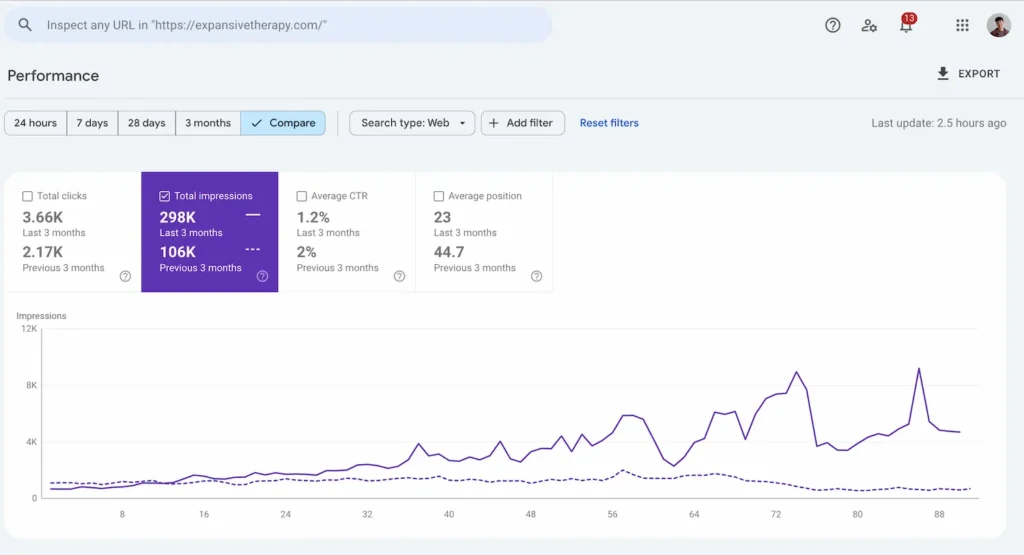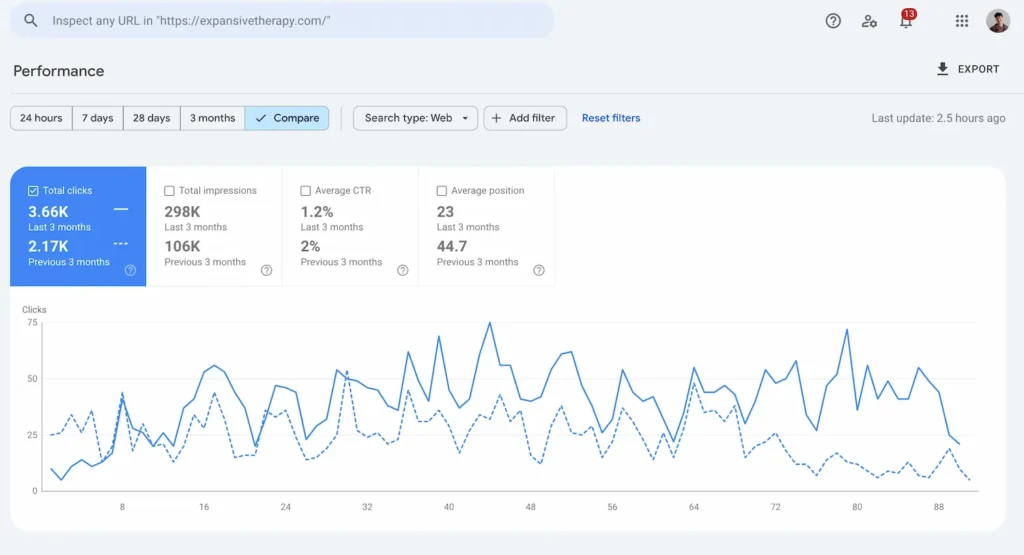Last updated: 17 June 2025 | Estimated reading time: 14 min read
Is SEO for therapists really necessary? Or can we just stick to the old strategy of relying on referrals and word-of-mouth?
Before, most industries relied on word-of-mouth marketing, where happy customers would spread the word about a product or service. The goal was to spark organic conversations and bring in new clients through referrals.
But nowadays, with the internet being so powerful and so widely used, many industries have shifted their marketing strategies online. Practitioners and business owners use websites to boost their visibility. The best part? Online marketing gives businesses a much wider reach—especially when done right.
This is where Search Engine Optimization (SEO) comes in. It helps improve a website’s ranking on search engines, making it easier for people to find you. With better rankings, you attract more organic traffic, reach a wider audience, and increase engagement—potentially turning visitors into clients.
The thing is, SEO isn’t just for online shops or big companies. It’s just as useful for service providers like lawyers, doctors, and therapists.
Why is SEO for therapists important?
People nowadays turn to Google for almost everything—including finding a therapist—so having a strong online presence can make a huge impact on your practice. With the right SEO marketing strategy for therapists, you’ll be able to take your online presence to the next level.

Here are some of the benefits you might get from improving SEO for mental health therapists:
SEO can bring more website traffic
By optimizing your website with relevant keywords and high-quality content, you can attract more visitors who might be actively looking for mental health support.
When your website ranks higher in search engine rankings, it becomes more visible, which translates to more website traffic. This means that more people can see what mental health services and support you offer.
SEO can boost your bookings
More website traffic means more inquiries and bookings. When potential clients easily find your site and see helpful information that meets their needs, they’re much more likely to reach out.
A well-optimized website brings in visitors and guides them toward scheduling a session with you.
SEO can save more money in the long run
Compared to traditional advertising methods or paid advertising, SEO is a cost-effective way to highlight your practice. Once your website is optimized, it continues to attract traffic even without the ongoing costs that other advertising methods rely on.
SEO might seem like a big investment, especially when paying for services like an SEO audit to spot areas that need improvement. But in the long run, it’s actually a more affordable and sustainable way to grow your practice.
What you can do to improve your website’s SEO
Now that we’ve settled the benefits of improving your website’s SEO, let’s talk about the simple things you can do to start your SEO journey. Remember, even the smallest tweaks can bring you great results!
Make a Google Business Profile
One of the first things you can do is to set up your Google Business Profile (GBP). You can look at this as an online directory that provides all the necessary information about your business. This includes your name, address, phone number, opening and closing hours, services, and the like.
Another benefit of establishing a GBP is that it allows your practice to appear in local search results and Google Maps. This is super useful for people searching with terms like “psychologists near me” or “mental health therapists near me.” By setting up a GBP, you’re increasing your chances of being recommended for searches just like these.
Want to learn more? We wrote a blog post all about how Google Business Profiles helps your local SEO!
Be consistent with the details
Details are important, especially for practices involving law and health. When people search for a therapist, they want to see details that are updated and consistent. This means that you have to make sure your Name, Address, and Phone Number (NAP) are consistent throughout.
Having inconsistent information across your website and all online directories might affect your local SEO (we’ll talk more about this next!). Plus, inconsistent NAP details confuse search engines and potential clients, which will negatively impact your rankings and credibility. Remember, you want to be seen as someone trustworthy and credible, and that starts with these little details!

Prioritize your local SEO
SEO is also a powerful tool for improving your visibility in local search results. For example, if you’re a therapist in New York, your main goal is to attract clients in your area, not people from across the country. After all, when someone searches for “therapists near me,” they’re looking for someone they can visit nearby.
That’s where local SEO comes in handy. To connect with potential clients in your community, focus on topics that are relevant to them. This could include addressing common concerns specific to your area or answering local mental health-related questions. By tailoring your content to your local audience, you increase the chances of showing up in their search results.
Another thing you can do is add location-specific keywords to your content, such as mentioning your city or neighborhood. For example, instead of just saying “licensed therapist,” you could say “licensed therapist in New York City” or “depression counseling in New York.” This helps search engines connect your website to local searches, making it easier for potential clients in your area to find you.
You can also add these relevant location-specific keywords in your meta descriptions, headings and subheadings, and even image alt texts to give your local SEO an additional boost.
Publish relevant content
Quality content remains to be the backbone of a great SEO strategy. Not only does content enhance your website’s visibility in search engine results but it also helps you establish your authority. Plus, it’s a great way to engage with your target audience.
You should also post informative and engaging content regularly, meaning you have to update your website from time to time. SEO is not a one-time thing but a long-term strategy.
Add service pages to your website
Aside from putting the basic information as your NAP in your website, you can also add service pages to it to attract more potential clients. These service pages provide detailed information about what kind of services you offer, making it easier for your visitors to understand how you can help them with their needs.

Some of the service pages you can add are the following:
- Home page — This is the first page your visitors see, so it must be welcoming yet informative. You want these visitors to know right away what kind of practice you’re providing.
- About page — SEO doesn’t have to feel pushy or “salesy.” It can be done in a way that makes your clients feel seen and understood. One great way to do this is by adding a personal touch to your website, like a page that shares more about you as a therapist. Through this, your visitors will feel like they’re connecting with a real person who genuinely wants to help them.
- Service page — There are so many types of therapies out there, and your visitors might not be familiar with all of them—or they could be looking for something specific. By clearly listing the services you specialize in, they’ll be able to easily decide if your offerings are the right fit for them.
- Pricing page — Transparency is key when it comes to services like therapy. Visitors and clients will appreciate having clear information about session costs or any available packages. It shows that you genuinely care about them and aren’t hiding any surprise fees.
Build your authority and credibility
Clients are more likely to book a session with someone they trust, so building your credibility is super important! One way to do this is by getting backlinks from reputable, relevant websites. Quality backlinks—links that lead to your site—tell search engines that your site is trustworthy and authoritative, which can boost your SEO.
Another way to build credibility is by asking for customer reviews. When visitors see testimonials from real, satisfied clients, they’re more likely to reach out and inquire about your services.

Choose the right CMS platform
There are plenty of Content Management Systems (CMS) out there that promise visually-pleasing websites. But here’s the catch—not everything that looks good will actually help with SEO. Many of these platforms lack the advanced SEO features you need to improve your online visibility.
Take Pepitone Law, for example. This site is dedicated to supporting mental health professionals, and in a field where trust and professionalism are everything, having strong SEO is pivotal.
After I ran an SEO audit, I found that one of the site’s main issues was that it was built on Squarespace. Now, Squarespace isn’t the worst CMS out there (looking at you, Wix…), but its technical SEO capabilities are still limited.
If you want better long-term results, consider using a more SEO-friendly platform like WordPress. It offers more flexibility and advanced SEO features, saving you a lot of time and effort down the road.
Expansive Therapy & the power of therapist-written SEO content
I’ve been working with Expansive Therapy, a queer-affirming mental health practice based in NYC and California, for nearly five months now. When they first reached out, they weren’t looking for an aggressive marketing overhaul—they just wanted to understand how to improve their visibility while staying true to their voice and values.
Their website was built on Framer, which—don’t get me wrong—is an incredibly fast, modern platform. (I talk more about that in this post about Framer and SEO). But like many newer web builders, it comes with its SEO limitations. I made sure they understood that from the start. And yet, instead of insisting on a platform change, we focused on what we could control.
What stood out to me right away was how well they were already doing one thing that most practices struggle with: content. Their therapists were mostly writing their own thoughtful, client-centered articles grounded in actual expertise.
And that? That’s gold in SEO.
They made the smart decision to continue with me after the audit, where I delivered a custom SEO best practices guide tailored to their brand voice. This helped bridge the gap between clinical language and SEO-friendly structure. No keyword stuffing. No jargon. Just clear strategies that worked with what they’d already built.
Retroactive SEO: real results, real fast
As part of our second month together, we selected three of their existing blog posts for retroactive SEO optimization. Here’s what happened after just a few weeks:
- Clicks nearly doubled across all three posts
- Impressions increased by 96.7%
- Average position on Google improved by 10 spots

Caption: Performance snapshot from Google Search Console showing a 181% increase in impressions after SEO improvements for Expansive Therapy. Average ranking improved from position 44.7 to 23.

Caption: Click performance from Google Search Console reveals a strong upward trend—clicks increased by nearly 70%, driven by better visibility and ranking gains in organic search.
We didn’t rewrite the soul of their content—we simply added SEO structure, cleaned up metadata, optimized headings, added internal links, and made sure their content could shine in search.
Their voice stayed intact. Their rankings improved.
What this means for other therapists like you
If you’re a therapist writing your own content—first of all, that’s amazing. You’re already ahead of the game. But SEO goes beyond just writing content. You need to make sure Google understands it’s good, too.
That’s where search engine optimization comes in.
Whether you’re on Squarespace, Framer, or WordPress, there’s a way forward.
Yes, WordPress gives you more long-term flexibility and technical control (especially when you’re ready to scale). But if you’re just starting out, don’t panic. The key is working with someone who can meet you where you are, and make what you’ve already created go further.
Frequently Asked Questions about search engine optimization for therapists
SEO for therapists is the process of optimizing your website and online presence so potential clients can find you when they search for mental health support online. It includes strategies like using the right keywords (e.g. “therapist in NYC”), creating useful content, and improving your Google Business Profile to appear in local searches.
Yes! Therapists who invest in SEO can boost their visibility in search engines, attract more site visitors, and increase their chances of booking sessions—all without relying solely on word-of-mouth or paid ads.
Results vary, but many therapists start seeing traffic and ranking improvements within 1–3 months—especially with retroactive SEO applied to existing content. Long-term SEO usually compounds over 6–12 months with consistent strategy.
Use a mix of service-based and location-based keywords like:
– “anxiety therapy in Brooklyn”
– “licensed therapist NYC”
– “online therapy for couples”
Avoid keyword stuffing—use them naturally throughout your site.
They serve different goals. Paid ads offer fast visibility but stop the moment you stop paying. SEO takes time but builds lasting visibility and authority. Many therapists benefit from starting with SEO, then layering in ads if needed.
A Google Business Profile helps you show up in maps and local packs—but your website builds trust and allows you to explain your services in-depth. For best results, you need both working together.
WordPress offers the most SEO flexibility. Squarespace and Framer can work too, but often need workarounds for advanced optimization. Choose the platform that matches your comfort level, but ensure it supports basic SEO needs.
Local SEO helps your site show up when people search things like “therapist near me.” This is crucial for service providers like you who see clients in specific regions. Optimizing for local search increases your chances of being found by nearby clients.
Absolutely. Therapist-written content is often more authentic and resonates better with clients. With light SEO structuring (like optimized headings, keywords, and internal links), it can rank well while keeping your voice intact.
Start by:
1. Claiming your Google Business Profile
2. Ensuring your site has clear service pages
3. Using relevant keywords naturally
4. Getting listed in online directories
5. Adding testimonials and backlinks
6. Posting regular blog content
Or better yet—work with an SEO expert who understands therapy websites (hint: hi there! 👋).
Get quality SEO services for therapists

Looking for SEO services for therapists? Read on to learn about how we can help.
Caring for people’s mental health is a noble profession, and as a therapist looking to grow your online presence, your strategy shouldn’t just be about showcasing your credentials. More importantly, it’s about truly connecting with your audience on a deeper, more personal level.
At Marketing by Rocio, we know that connection is everything in your line of work. Your clients need to feel seen, heard, and understood—and this journey starts with how they find you online. We’re here to help you build those meaningful connections by providing you quality SEO services that resonate with your practice.
Reach out today!







